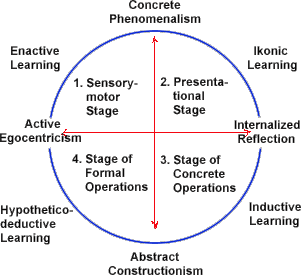Lesson 20: Concrete and Formal Operational Thinking/Information Processing
Attention

Physical changes in the brain during adolescence, discussed previously in this class, correspond to different mental capacities. In this lesson we continue to explore the models of Piaget and Information Processing
Learning Outcomes
Upon completion of this lesson's material, students will be able to:
- Identify changes in cognitive functioning related to both the information processing and genetic epistemology models
Teaching
Changes in Cognitive Functioning
We recognize that adolescence is an age of dynamic brain development. As discussed earlier, there are specific developments in the brain related to synaptic pruning, the development of more refined neural connections, and the development of increased dopamine producing cells and connections in the prefrontal cortex. But what does this mean?
- Increased impulse control, planning, and decision making
- Development of adult response to stimuli as being more intellectual (early adolescence starts out as "gut")
- Ability to plan and adapt to social environments
- Development of emotional intelligence
- Basic development of memory capacity and retrieval
Information Processing
- Increased working memory and processing speed
- Content knowledge, strategies, and metacognitive skills
- Problem solving and reasoning
- Identifying fallacies in arguments
Genetic Epistemology
Late childhood and adolescence relate to the development of Concrete Operational Thinking and Formal Operational Thinking

- Consider this in light of the concept of manipulating ideas
- Concrete - can manipulate concrete ideas
- Formal - can manipulate abstract ideas
- According to Piaget - not everyone ever develops Formal Operational Thinking
Why do we study Algebra? Algebra presents challenges to some thinkers who are not accustomed to, or have not developed the ability to engage in abstract reasoning...i.e. Formal Operational Thinking. Just like we know that we rarely have the need to engage in FOT, we sometimes wonder why we need to study a topic like Algebra...exercising skills we may never use...but this is not the case. Lifting Weights If someone lifts weights to exercise why do they do this? At is unlikely that a terrorist will present anyone with a dumbbell and threaten to kill them if they can't do 20 curls! So why lift weights. We lift weights because it may make the physical activities we DO engage in easier. Lifting a box, carrying groceries, etc. Studying Algebra So what does studying Algebra get you ready for? Problem Solving!! When we are problem solving, particularly when it is a complex problem, we are best served by approaching the process through deductive reasoning.
Consider a typical formula in Algebra 4x + 2y = 3z In Algebra we are asked to "solve for z" or something like that. This is much the same process we go about when we are solving real-world problems. We might not know all the variables, and in fact, we might not even know the nature of the answer we are seeking, but we need to solve the problem anyway!! By exercising these skills in Algebra we develop stronger FOT and a better ability to solve everyday problems. By the way, the answer to the above question is: z = (4x + 2y)/3 |
Assessment
Lesson 20 Discussion
Speculate why it may be that many people never develop Formal Operational Thinking, and discuss why it may not be necessary to develop much Formal Operational Thinking.
In addition, discuss why specific school-related tasks, such as critical thinking, algebra, and problem solving, might make you BETTER prepared to deal with the complexities of our society.